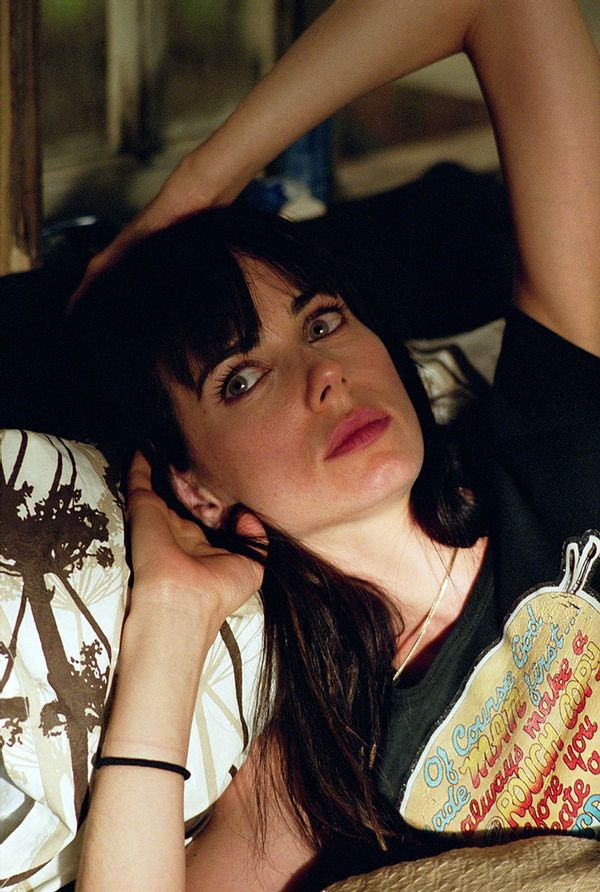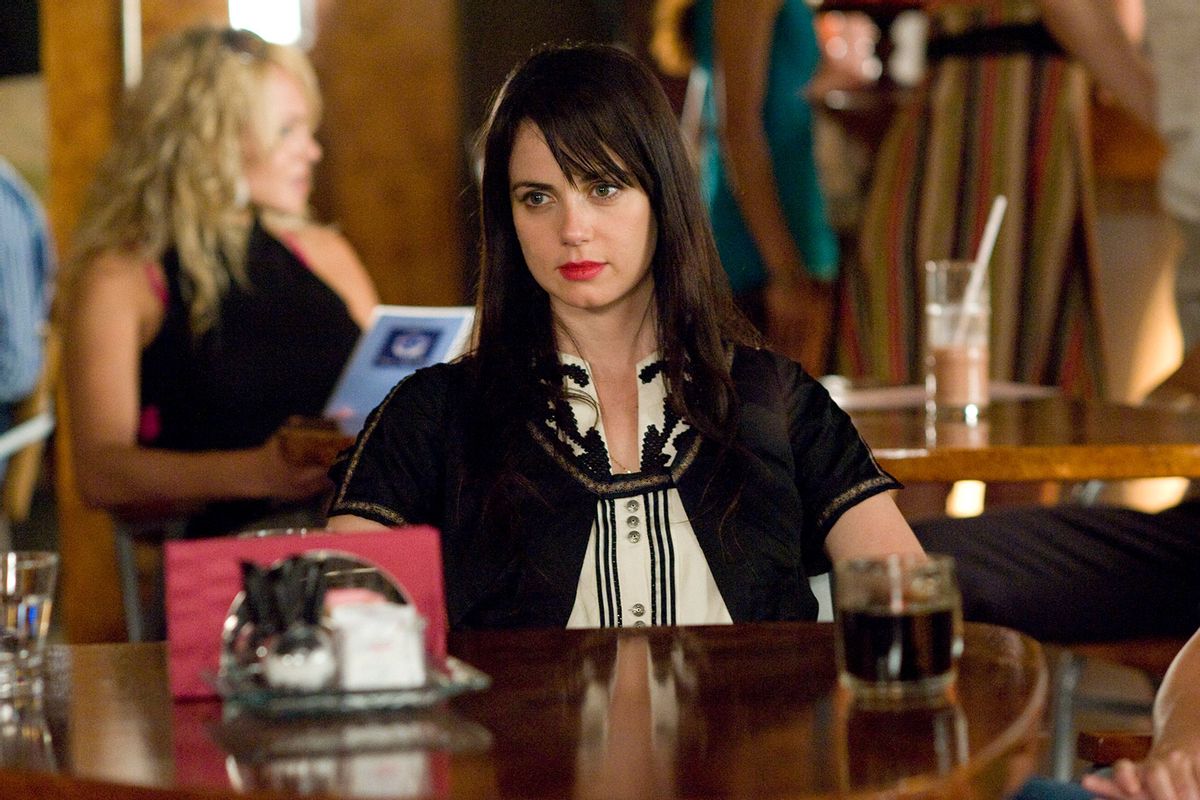When "The L Word" first debuted on Showtime in the winter of 2004, its core audience of lesbian and bisexual women jumped on it like a metaphorical life raft, and then almost immediately began poking holes in it — continuing to do so until the show, and the raft with it, could no longer hold the weight of everything that was expected of it.
In its simplest description, "The L Word" was a show about a group of friends living in West Hollywood who, when not hanging out at the local coffee shop, The Planet, were busy cheating on their partners or seeking out new partners to cheat on. The notoriously bad theme song for the show tipped viewers off as to what was in store for them with the lyrics "talking, laughing, loving, breathing, fighting, f**king, crying, drinking, riding, winning, losing, cheating, kissing, thinking, dreaming." But there was a much more nefarious "ing" at work here: framing.
As an immediate fan of "The L Word," and someone who hung on each plot point as though it contained Biblical importance, I caught on quick that the show's creators Ilene Chaiken, Michele Abbot and Kathy Greenberg responded to fan criticism that it lacked diversity, leaned on financial and beauty privilege and saw trans people as a punchline not by fixing these issues throughout the series' original six seasons, but by offering up one main character as a sacrificial lamb.
Seemingly in an effort to distract from evils in the show greater than a self-absorbed writer, the showrunners turned on Jenny
In the pilot of "The L Word," the characters of the show are introduced through the eyes of Jenny Schecter (Mia Kirshner), a raven-haired ingenue from the Midwest who relocates to L.A. to live with her boyfriend Tim (Eric Mabius) and pursue a career as a fiction writer. Captivating from the jump for her ability to express even the smallest of emotions through her eyes alone and deliver dialogue that would otherwise be banal in a way that comes off as dramatically hilarious, Jenny is set up as the show's protagonist as we watch her fall in love with a woman, split from everything she thought she knew about where her life was headed and develop her own personality apart from just being some guy's girlfriend. But then, seemingly in an effort to distract from evils in the show greater than a self-absorbed writer, the showrunners turned on Jenny starting with the second season, and most (not me) fans followed their lead.
 Mia Kirshner as Jenny Schecter in "The L Word" (Courtesy of Showtime)By the sophomore season of "The L Word," and really ramping up in Season 4, the elements of Jenny's character that made us initially love her — her lack of a filter, her drive to become known for her writing, her ability to insult someone by calling them a "vagina wig" and have it sound like a poem — were being written with negative connotations and made to seem like flaws. Even her attempt to heal from sexual abuse she suffered as a child was used as a way to show her as being "weird."
Mia Kirshner as Jenny Schecter in "The L Word" (Courtesy of Showtime)By the sophomore season of "The L Word," and really ramping up in Season 4, the elements of Jenny's character that made us initially love her — her lack of a filter, her drive to become known for her writing, her ability to insult someone by calling them a "vagina wig" and have it sound like a poem — were being written with negative connotations and made to seem like flaws. Even her attempt to heal from sexual abuse she suffered as a child was used as a way to show her as being "weird."
We were being told to dislike this character who was more interesting to watch fill out an application to work at a grocery store than most of the other characters were during an entire season's narrative arc, but why?
Chaiken and her team of writers heard "this show has some problems," and decided to make Jenny that problem. They wrote her in, wrote her wrong, and then wrote her out in a ridiculous sixth season that ends with her dead body discovered in a swimming pool. Initially this series finale, which almost the entirety of the cast have since gone on record saying they wish had never happened, was set up as a ham-handed murder mystery with the added insult of a wink to the camera. "Who Killed Jenny?" With the joke being. "Everyone wanted to kill Jenny."
But, later, in the show's sequel series, "The L Word: Generation Q," we learn that she wasn't murdered at all, she'd died by suicide.
In 2019, Kirshner, in typical Jenny fashion, pulled no punches in expressing her distaste in how her character was handled. Learning how the show tied up the mystery of her death the same way as we did, by watching "The L Word: Generation Q," Kirshner fired off a series of tweets in defense of her character.
"Nope. Jenny is not dead," Kirshner tweeted. "That's not the story that needs to be told about a survivor of sexual violence. It's not a story that can be wrapped up and tied up with a bow. So no, she is not dead."
Engaging with fans replying to her statement, the actress told one, "I heard about her 'suicide' today and feel sick." To another she said, "I just found out about what they did with the storyline today, and there is no way that I'm going to stay silent about this."
Even though the show has learned from ten years of cultural observation, and benefitted by expanding its cast to include people of all ethnicities, income brackets, and gender identities, it's still lacking something. It's lacking Jenny.
When sacrificing Jenny to satiate viewers' criticism of "The L Word" didn't work, Chaiken waited 10 years and then tried again with "Generation Q." But even though the show has learned from 10 years of cultural observation and benefitted by expanding its cast to include people of all ethnicities, income brackets and gender identities, it's still lacking something. It's lacking Jenny.
 Leisha Hailey as Alice Pieszecki and Mia Kirshner as Jenny Schecter in "The L Word" (Paul Michaud/Showtime)Apart from a few cameos, "The L Word: Generation Q" carried over only three of the core cast members from the original series: Jennifer Beals as art world big wig Bette Porter, Leisha Hailey as journalist turned talk show host Alice Pieszecki, and Kate Moennig as sex worker turned hair stylist turned bar owner Shane McCutcheon. Of these three, Shane has remained the most stagnant. In the first two seasons of "Gen Q" we're shown how she's come into a bit of money and is doing well for herself professionally, but still struggles with her lothario ways.
Leisha Hailey as Alice Pieszecki and Mia Kirshner as Jenny Schecter in "The L Word" (Paul Michaud/Showtime)Apart from a few cameos, "The L Word: Generation Q" carried over only three of the core cast members from the original series: Jennifer Beals as art world big wig Bette Porter, Leisha Hailey as journalist turned talk show host Alice Pieszecki, and Kate Moennig as sex worker turned hair stylist turned bar owner Shane McCutcheon. Of these three, Shane has remained the most stagnant. In the first two seasons of "Gen Q" we're shown how she's come into a bit of money and is doing well for herself professionally, but still struggles with her lothario ways.
By the current third season, she's all but reverted to the Shane we first met back in 2004, to the show's detriment. In the early 2000s it may have seemed sexy to watch the character positioned to be the bad girl/heartbreaker in the group jump from one-night stand to one-night stand, chainsmoking in a dirty room and mumbling about not being into sleepovers. But, nearing 2023, it just feels cheesy. If this show can defy logic by telling fans, "Here she is! Your ol' favorite, Shane!" And then hand us what is, sorry to say, an emotionally enfeebled loser about to turn 40 and think we'll be thrilled, then they can go one step further and find a way to write Jenny's character back in. They already gave us the ghost of Dana Fairbanks (Erin Daniels) waving from a waterfall. Let's see Jenny rise up out of Bette's pool.
In episodes of the podcast that real-life friends Hailey and Moennig created – called "Pants,"dubbed such by Kirshner after witnessing the duo's tight bond and equating it to two legs of a pair of pants ("can't have one without the other") – they downplay their own characters in Season 3 of "Gen Q." In one episode, Hailey says you could put a blonde wig on a chicken and send it in to do Alice's lines and no one would know the difference. In another episode, Moennig says the same of her own character and a raccoon. The show may be safe now, in terms of how it handles LGBTQ politics and such, but it's flat. Maybe too safe.
Want a daily wrap-up of all the news and commentary Salon has to offer? Subscribe to our morning newsletter, Crash Course.
Throughout the six seasons of the show's original run, I quickly, and without excuse or apology, was drawn to everything about Jenny that seemed to repel other fans of the show. She was reclusive and rude and self-centered. She was a cheater. She hated children and made great use of the word merkin. She wrote terrible poetry about offering up her glands and sweetbreads as a token of love. She was a beautiful monster, and I hung on her every word while she was on screen. Even during her manatee phase. She didn't need bizarre side stories to make her interesting, even though the writers tripped over themselves to give them to her. She was interesting just because she was Jenny Schecter. What's not to like about that?



Shares